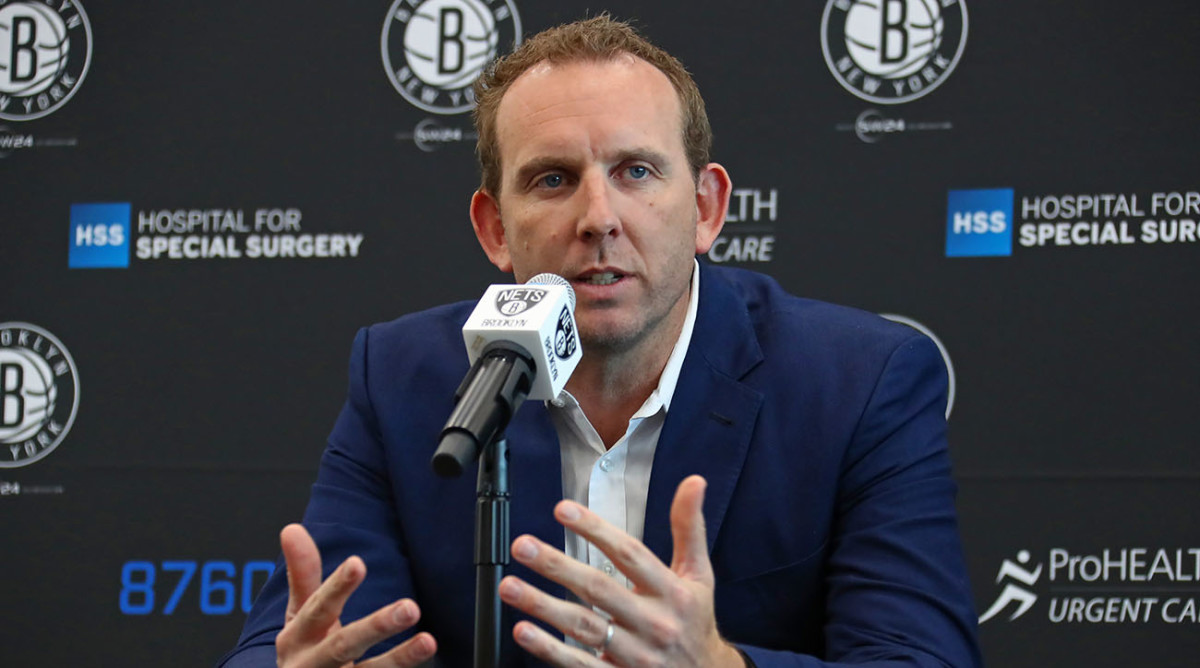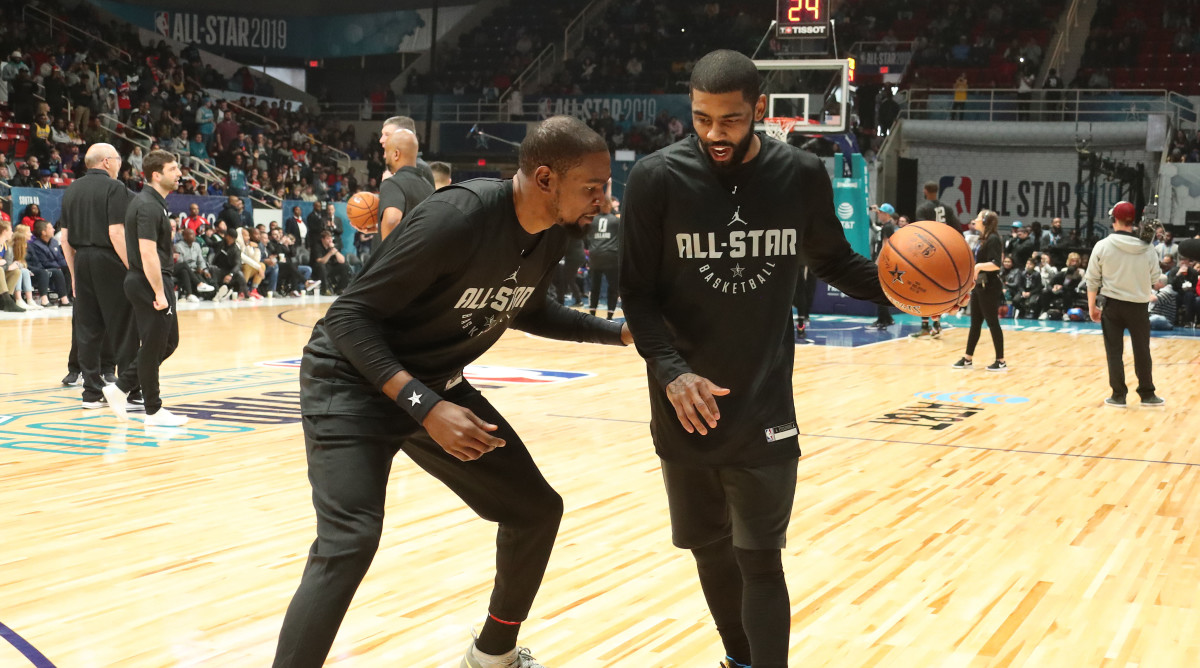Sean Marks Q&A: How the Nets' Calculated Risks Landed Kevin Durant and Kyrie Irving

In February 2016, Sean Marks, an assistant GM in San Antonio, just five years removed from the end of his playing career, took on one of the NBA’s toughest tasks: Rebuilding the Brooklyn Nets. The Nets were sliding, and the prospect of a traditional rebuild through the draft would be difficult, with Boston controlling Brooklyn’s first-round picks through 2018.
A little over three years later, the Nets are coming off a playoff season. Earlier this month, Brooklyn landed two of the biggest free agents on the market. Last week, SI examined how the Nets were able to pull off the most successful summer in franchise history. Marks spoke at length with SI for that story.

Chris Mannix: Take me back three and a half years—when you were offered this job, knowing what this job was, was there any hesitation on your part to take it?
Sean Marks: Was there hesitation? From my perspective, I looked at the good, the bad, the ugly and everything else. At the end of the day, I was extremely excited about the challenge, about the possibility, a little bit of the what if? Could you turn this around? Is there a possibility? How long will it take? There was plenty of naysayers out there but I think the biggest rewards, when you look back, are the stories that people took a risk. Personally, I just bet on people. That's all I've done this whole time here is bet on the right people. Everybody here has ownership of this whole thing. By no means is it one or two guys. It's an army, per se.
CM: You worked with some successful people in San Antonio: Gregg Popovich, R.C. Buford. What are some of the things you wanted to take from that experience with you to Brooklyn?
SM: I mean, everybody talks about culture. I think that term is, to be quite honest, thrown around far too freely and almost flippantly these days. Just to say, "Well, we're going to change a culture. We have changed a culture. We've done this, this, that and the other." Whatever it is, is really wrong because the culture's going to be evolving all the time. The Spurs [culture] is well documented. A values-driven family culture, family environment they had there. There was certainly some things there that we wanted to take. It resonated with me too. It's one thing to say, "Well, we're going to change the culture," but you have to be a firm believer in it. You have to believe that, this is who I am, this is how I want to compete.
I always remember the big picture way Pop looked at things. You could sit there and deliberate on an idea, whether it was a free agent, or a draft guy, or as simple as your travel schedule and should you practice on a day or should this be an off day? The way he was able to just focus and really, for lack of a better term, dumb things down and really simplify things to show, "Well, this is how we're going to do it. Let’s look at it. What does Tim Duncan want to do? How does Manu Ginobili feel about this?" I think there's a lot of that that we try to do, and not get lost in the weeds. If we can stay true to our building blocks, the things that really matter, we won't get carried away and worried about all the little things that can somehow derail a vision pretty quickly.
CM: Players have talked to me about how well you treat their families. Is that part of it?
SM: Absolutely. I was a journeyman, so I saw how they did things and they certainly did things right. I had an appreciation for that because I had a family. I've lived it and it resonates with me and my wife and kids because they’re the most important thing in the world to me. I know how the players feel about their significant others, loved ones.
I think one thing that's sorely missed is the sacrifice that everybody around you has to make in order for you to be the best All-Star, the best 15th man, the best GM, the best assistant coach, whatever it may be, the best trainer. That you have to acknowledge those people. They're owed that, to be quite frank. I think if we can take care of those people, whether it's an uncle, a brother, a sister, a child, a wife, whatever it may be. Because the distractions are taken away they can rest assured that, "My wife or my significant other's being taken care of."
CM: Last offseason, you were coming off a 28-win season. You were improving, but you were a long way from being a contender. Were you thinking then about being players in this summer’s free agency?
SM: We planned a couple years out that we could have an opportunity here … now you never know how it's going to play out because there are a lot of different contracts, guys can opt-in, guys can opt-out but again, for us, really the big picture was going to be staying flexible and never getting locked into a team that we thought really couldn't compete at the highest level. I think when you have a window or you have an opportunity to swing for it and take a chance, take a challenge, and you can do it with the right people that's when you have to do it.

CM: And specifically Kevin Durant and Kyrie Irving?
SM: It's pretty well documented that those two, KD and Kyrie, have some sort of [relationship], that they would like to play, at least those were the rumors. We know they're close friends, obviously, but the other side to that is there were going to be other opportunities to pair max-type free agents together. I don't know that we knew exactly when it was happening. I don't think you know until you get these guys in your building and you sit down with them for the first time.
CM: Last December, you guys were really scuffling. Did you have any doubts then about the direction the team was going?
SM: No. it sounds a little strange, but I didn't have doubts because when we went through that tough little patch there, losing eight in a row, Kenny and I were obviously spending a lot of time together. Every day, we got our alone time together, which is great. And to be honest he was a rock during that time. I mean he was sitting there saying, "We've got to trust what we've done, got to trust the people we've brought in, this is going to turn, this is going to turn." And I admired that. I love that. I loved hearing that. And you can't hope for anything more than to hear your head coach have the passion. And the will to just sort of compete and never give up. I love that about Kenny and he sort of wills that throughout the organization.
CM: Kevin and Kyrie are unbelievable talents. But was there anything analytically that made you think the talents would mesh well together?
SM: I think there's a combination of things. I think the risk-reward here where you're saying, "Hey, how can we add that level of talent into our group?" And whenever you can do that, I think you probably should jump at the chance to do that, especially guys that want to be here, especially them. I think they were, they probably sold each other a lot earlier on the idea of playing together, whether it was Brooklyn or New York or a big market playing. I mean, I think what we were able to give them, and hopefully we will give them is the opportunity to continue to develop, whether that's through a performance team that's going to do everything we can for Kevin. And I think when you have the right people and skills within your team, you can take a little bit of that risk.
I mean, we took that risk with Caris LeVert early on where his college career was cut short on a couple of different occasions because of an injury. And then he buys into performance people that we have and next thing you know, I think the proof is a little bit in the pudding there with how he's come back from that. So we're able to take calculated risks there. And every team does this, whether it's a calculated risk through analytics or through a performance team and so forth. Or just through your culture and through the people that you've already got around the system.
CM: This team was in a bad place when you took the job. Have you taken any time to marvel at how far the Nets have come?
SM: No. I'm not really good at that. I would never let myself do that. I think one thing I have learned, from being in the GM chair, is that the second you take a sigh of relief or just a deep breath and exhale, that's where something comes and creeps up on you that you weren't aware of or you were not expecting. As the office knows, I don't like surprises at all.
So yeah, at some point, I'm sure there'll be a time where you can sit back, but—and I think I speak for Kenny in this too, for both of us and really the whole organization here is—the last thing we would want to do is sit back and ponder on how far we've come because we know how far we've got to go. And we all took on the challenge for the ultimate goal. That's why we do this. To be honest, if you're not wanting that or willing to sacrifice, and give up something for the team, you probably won't last long here. It just doesn't work that way.
